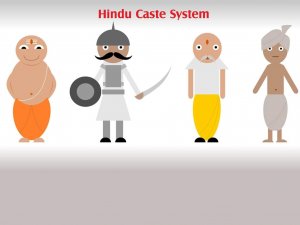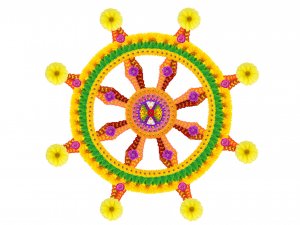Kabeer, let yourself be like a pebble on the path (become tolerant as the pebble); abandon your egoism. Such a humble slave will meet God. ||146||
Kabeer, what good would it be to be a pebble? It would only hurt the traveler on the path. Your slave, O God, is like the dust of the earth. ||147||
Kabeer, what then, if one could become dust? It is blown up by the wind, and sticks to the body. The humble servant of God should be like water, which takes the shape of the vessel it is in. ||148||
Kabeer, what then, if one could become water? It becomes cold, then hot. The humble servant of God should be just like God ||149|| (sggs 1372).
The Spiritual Quality of true humility belongs to a godly person (Gurmukh) endowed with Divine Nature. Such a person is humble, modest, and kind; for he never performs any act that is not in harmony with the flow of the Divine in each moment.
Accordingly, humility abides in the hearts of those fortunate ones who have divinized their inner being: the mind, intelligence, consciousness, and ego. The importance of this divine virtue of humility is underscored in Gurbani. One can test and judge himself by this virtue to see how far his own spiritual unfoldment is progressing.
True humility is one of the essential qualifications of a godly or a transcendentally anchored person. Other transcendental qualifications follow. By meeting such humble being a lowly conditioned being is transformed into Divine Consciousness! This is called Darshan. Humility puts us in a right relation to God and His Creation. Therefore, the Gurbani urges us to acquire humility. As we will see later in this article, humility is the state of Being as well as the process of obeying and reconciling one's life to God's Hukam (Eternal Law or Will) through Naam or Shabad. This is the relationship that allows us to acquire wisdom. We understand by standing under.
ਸੇਵਕ ਸੇਵਹਿ ਗੁਰਮੁਖਿ ਹਰਿ ਜਾਤਾ ॥ ਅੰਮ੍ਰਿਤ ਨਾਮਿ ਸਦਾ ਜਨ ਸੋਹਹਿ ਗੁਰਮਤਿ ਹਰਿ ਰਸੁ ਪਾਵਣਿਆ ॥੨॥:
Sewak sevahi gurmukh Hari jaataa. Amrit Naam sadaa jan sohahi gurmat Hari ras paavaniaa ||2||
Becoming a Gurmukh, the humble servant who serves Hari comes to know Him. Living in the Nectar Name, those humble beings look beautiful. By practicing Gurmat (the Guru’s teachings) they enjoy the sublime essence of Hari||2|| (sggs 126).
Humility Defined
Material life or body-consciousness (Maya) makes us very eager to receive honor, flattery and recognition from others. Our projected persona is expressed through the ego and thoughts revolve around self. The person in true humility is never anxious to have the satisfaction of being honored, flattered or recognized by others. Because such person is in Perfect Knowledge (Aatam-Giaan) or Intuitive Understanding and knows that he is not his body or his persona. To such a person, honor or dishonor, fame or anything else pertaining to this self is unimportant.
ਸਰਮ ਸੁਰਤਿ ਦੁਇ ਸਸੁਰ ਭਏ ॥ ਕਰਣੀ ਕਾਮਣਿ ਕਰਿ ਮਨ ਲਏ ॥
Saram surti dui sasur bhae. Karnee kaaman kar man lae
Modesty and intuitive understanding are my parents-in-law; I have made right actions my spouse (sggs 152).
True humility is the recognition of one's imperfections. It means living without any pretense – naked, open and vulnerable. It is a state of deep trust. Further, humility naturally results in seeing others as better than yourself. The material conception of life makes us find faults in others by ignoring our own faults because we are lacking humility. Due to this lack, we are unable to recognize our own imperfections. The humble and modest feeling of being meek and lowly comes spontaneously when the tenth gate (Dasam Duar) opens. All God-realized persons are the embodiment of true humility; for they have nothing to prove and always call themselves meek and lowly. Their pattern of humility is unblemished.
ਹਮ ਕੀਰੇ ਕਿਰਮ ਸਤਿਗੁਰ ਸਰਣਾਈ ਕਰਿ ਦਇਆ ਨਾਮੁ ਪਰਗਾਸਿ ॥੧॥
Ham keere kiram satgur sarnaaee kar daiaa Naam paragaas ||1||
I am a mere insect, a worm. O Sat Guru, I seek Your Sanctuary. Please be merciful, and bless me with the Light of Naam.ਹਮ ਨਹੀ ਚੰਗੇ ਬੁਰਾ ਨਹੀ ਕੋਇ ॥ ਪ੍ਰਣਵਤਿ ਨਾਨਕੁ ਤਾਰੇ ਸੋਇ ॥੪॥੧॥੨॥
Ham nahee change buraa nahee koi. Pranavat Nanak taarae soi ||4||1||2|| (sggs 728)
I am not good and no one is bad. Prays Nanak, He alone saves us!
ਕਬੀਰ ਸਭ ਤੇ ਹਮ ਬੁਰੇ ਹਮ ਤਜਿ ਭਲੋ ਸਭੁ ਕੋਇ ॥ ਜਿਨਿ ਐਸਾ ਕਰਿ ਬੂਝਿਆ ਮੀਤੁ ਹਮਾਰਾ ਸੋਇ ॥੭॥
Kabeer sabh te ham bure ham taji bhalo sabh koi. Jin aisaa kari boojhiaa meet hamaaraa soi ||7||Kabeer, I am the worst of all. Everyone else is good. Whoever understands this is a friend of mine. ||7|| (sggs 1364)
A truly humble man is sensible of the small extent of his knowledge, and the great extent of his ignorance, and of the limited extent of his understanding as compared with the Creator/Creation. He is sensible of his weakness, limited strength and limited ability.
ਹਮ ਅਵਗੁਣਿ ਭਰੇ ਏਕੁ ਗੁਣੁ ਨਾਹੀ ਅੰਮ੍ਰਿਤੁ ਛਾਡਿ ਬਿਖੈ ਬਿਖੁ ਖਾਈ ॥ ਮਾਯਾ ਮੋਹ ਭਰਮ ਪੈ ਭੂਲੇ ਸੁਤ ਦਾਰਾ ਸਿਉ ਪ੍ਰੀਤਿ ਲਗਾਈ ॥:
Ham awagun bhare ek gun naahee Amrit shaad bikhai bikh khaaee. Maya moh bharam pai bhoole sut daaraa siou preet lagaaee
We are full of demerits and have no merit or virtue. Abandoning the Amrit (Naam) we eat poison instead. Attached to Maya and deluded by doubt, we are lost. We have fallen in love (emotional attachment) with our children and spouse (sggs 1406)
According to Gurbani, humility is a formidable weapon. This weapon can be used to cut the roots of arrogant pride and false ego-sense (haumai.) It can be used to free ourselves from ostentatious, assuming, arrogant, scornful, stubborn, and self-justifying behavior. Thus, humility brings an end to arrogant and egotistical behavior. It disposes a person to be with the meekest and lowest and to treat inferiors with courtesy and affability, as being sensible of his own weaknesses before God.
ਗਰੀਬੀ ਗਦਾ ਹਮਾਰੀ ॥ ਖੰਨਾ ਸਗਲ ਰੇਨੁ ਛਾਰੀ ॥ ਇਸੁ ਆਗੈ ਕੋ ਨ ਟਿਕੈ ਵੇਕਾਰੀ ॥ ਗੁਰ ਪੂਰੇ ਏਹ ਗਲ ਸਾਰੀ ॥੧॥:
Gareebee gadaa hamaaree. Khanna sagal ren saaree. Is aagai ko na tikai vekaaree. Gur poorai ih gal saaree ||1||
Humility is my spiked club. My dagger is to be the dust of all men's feet. No evil-doer can withstand these weapons. The Perfect Guru has given me this understanding ||1|| (sggs 628)
ਮਿਠਤੁ ਨੀਵੀ ਨਾਨਕਾ ਗੁਣ ਚੰਗਿਆਈਆ ਤਤੁ ॥
Mithat neevee Naanakaa gun changiaaeeaa tatt.
The sweetness of humility, O Nanak, is the essence of all good virtues (sggs 470)
Humility is simply realism. A truly humble person is a perfectly realistic person. Consequently, a person of humility has an accurate self-concept. Due to his intuitive understanding of matter and spirit, he always knows where he stands in the scheme of things.
The word humility is also related to the word "humor." Persons possessing true humility (Gurmukhs) are full of inner joy and humor. Proud, self-absorbed people (Manmukhs) don't seem to laugh much. When Manmukhs do laugh, their laughter is phony, shallow, hurtful or contemptuous. They have anything but inner joy and peace.
ਸਹਜ ਸੁਹੇਲਾ ਫਲੁ ਮਸਕੀਨੀ ॥ ਸਤਿਗੁਰ ਅਪੁਨੈ ਮੋਹਿ ਦਾਨੁ ਦੀਨੀ ॥੧॥ ਰਹਾਉ ॥
Sahaj suhelaa phal maskeenee. Satigur apunai mohi daan deenee ||1||Rahaaou||
The fruit of humility is deep Intuitive Peace and Joy (Sahaj Avasthaa - ਆਤਮਕ ਅਡੋਲਤਾ) My Sat Guru has given me this gift. ||1||Pause|| (sggs 235)
ਤਿਨਾ ਅਨੰਦੁ ਸਦਾ ਸੁਖੁ ਹੈ ਜਿਨਾ ਸਚੁ ਨਾਮੁ ਆਧਾਰੁ ॥
Tinaa anandu sadaa sukhu hai jinaa suchu naamu aadhaaru (sggs 36)Thus, true humility is living each moment in the Shabad or Divine Name (Aatam-Giaan...) Thus, true humility is being free - Jeevanmukta - satisfied and fulfilled, kind and merciful, modest, full of beauty and radiance.
ਨਾਮੁ ਅਵਖਧੁ ਜਿਨਿ ਜਨ ਤੇਰੈ ਪਾਇਆ ॥ ਜਨਮ ਜਨਮ ਕਾ ਰੋਗੁ ਗਵਾਇਆ ॥
Naam awkhad jin jan terai paaiaa. Janam janam kaa rog gavaaiaa.
Your humble servant who obtains the medicine of the Naam is rid of the illnesses of countless lifetimes and incarnations (sggs 107-108).
ਆਪੁ ਤਿਆਗਿ ਹੋਈਐ ਸਭ ਰੇਣਾ ਜੀਵਤਿਆ ਇਉ ਮਰੀਐ ॥੨॥
Aapu tiaagi hoeeai sabh renaa jeevatiaa iou mareeai ||2||
Renouncing egoism (ਆਪਾ ਭਾਵ), become humble, the dust of all; in this way, die while still alive (i.e, become free.) ||2|| (sggs 750)
Humility and Assertiveness
A Manmukh with self-centered pride and lacking humility may say: "It's better to be dead than to be a worm, an insect, a lowly person or the dust on others feet". In other words, "What about assertiveness? What about my rights?", he may ask.
Humility does not mean one should not assert his rights. Being a Bhagat (devotee) does not mean giving up one’s rights. Being a humble servant of God does not mean that you let everybody walk all over you or let this world eat you up alive! No, that is not what humility is all about. In fact it is only complete surrender that brings true freedom.
Humility teaches equality, not manipulation. True assertive behavior is to stand up for ourselves without undue anxiety, to express honest feelings comfortably and to exercise personal rights without denying the rights of others. To put it otherwise, true assertiveness is to look not only to one's own interests but also to the interests of others. Therefore, true assertiveness is not the natural tendency of manipulating others to meet one’s own needs or desires at the cost of the other person’s sovereignty. Neither is true assertiveness aggression. Aggression is unhealthy and inappropriate, but true assertiveness is healthy and appropriate and flows naturally from the experience of one’s own sovereignty as a spiritual being.
A step-by-step analysis will shows us that true humility is essential for true assertiveness. According to Gurbani, fearlessness is an essential quality of a Bhagat (devotee.) Further, Gurbani tells us that one cannot become a Bhagat without true humility! In order for one to be a truly assertive person, one must be fearless and therefore must possess true humility. This is the reason in Gurmat (Divine Teaching of Gurbani, SGGS) a truly humble person embodies a saint as well as a soldier (Sant-Sipaahee.) Without true humility there can only be aggression, manipulation, anxiety, hate and hurt, but not true assertiveness.
ਸਰਨਿ ਪਰਿਓ ਨਾਨਕ ਠਾਕੁਰ ਕੀ ਅਭੈ ਦਾਨੁ ਸੁਖੁ ਪਾਇਓ ॥੨॥੩॥੧੨॥
Saran pario Nanak thaakur kee abhai daan sukh paayoNanak has entered the Sanctuary of his Lord, and has received the blessings of fearlessness and peace ||2||3||12|| (sggs 498)
Humility and Pride
Self-centered pride is the opposite of humility. The former is a demoniac quality, and the latter is Divine. According to Gurbani, if one is humble and understands himself to be a servant of God, he will never feel or act superior to others.
Humility is the product of Goodness. On the other hand, self-centered pride is the product of our evil, selfish nature. Every problem of this material life can be traced to our arrogant pride which stems from ego (Haumai.) For example, it is our pride that keeps us in the cycle of repeated pain and delusion.
It is good to have healthy self-esteem, satisfaction or delight in one's accomplishments. However, what is undesirable is the conceited attitude and feelings of superiority over others. Unfortunately, from our very childhood, this is exactly what we are taught — to feel superior to others!
What are the symptoms of false pride? A person inflicted with this disease finds himself on a "head trip;" his behavior is arrogant; he talks "up" or "down" to people rather than with them; he always wants to have his own way, even at the cost of another person’s wants; he always seeks fame, flattery, recognition and praise; he likes to be blessed by others rather than blessing them. He has a boastful attitude and constant compares himself to others. His own relationship with his God, his real Self, and genuineness with others takes the back seat. He is concerned only with what he sees as gain for himself and lacks empathy.
ਵਿਚਿ ਹਉਮੈ ਕਰਮ ਕਮਾਵਦੇ ਜਿਉ ਵੇਸੁਆ ਪੁਤੁ ਨਿਨਾਉ ॥
Vichi haumai karam kamaavde jiou vesuaa put ninaaou
Those who do their deeds in ego are like the prostitute’s son who has no name. (sggs 82).
ਤਜਿ ਅਭਿਮਾਨੁ ਜਨਮ ਮਰਣੁ ਨਿਵਾਰਹੁ ॥ ਹਰਿ ਕੇ ਦਾਸ ਕੇ ਚਰਣ ਨਮਸਕਾਰਹੁ ॥੨॥
Taj abheemaan janam maran nivaarahu. Hari ke daas ke charan namaskaaragu ||2||
Renounce your arrogant pride, and end the cycle of birth and death. Bow in humility at the feet of God’s servants ||2|| (sggs 191)
ਬੁਧਿ ਗਰੀਬੀ ਖਰਚੁ ਲੈਹੁ ਹਉਮੈ ਬਿਖੁ ਜਾਰਹੁ ॥
Budh gareebee kharach laihu houmai bikh jaarahu
Take wisdom and humility as your fuel and burn away the poison of ego. (sggs 399).
Cultivating Humility
As made very clear by the Gurbani, true humility is essential for linking with our Mool within (Root or Origin.) Without humility there can be no Self-realization. Baabaa Nanak's entire life is exemplary in this regard — he always prayed to God for two things: humility, and Naam.
ਨਾਮੁ ਜਪੇ ਨਾਮੋ ਆਰਾਧੇ ਤਿਸੁ ਜਨ ਕਉ ਕਰਹੁ ਸਭਿ ਨਮਸਕਾਰੁ ॥ ਮਲੁ ਕੂੜੀ ਨਾਮਿ ਉਤਾਰੀਅਨੁ ਜਪਿ ਨਾਮੁ ਹੋਆ ਸਚਿਆਰੁ ॥:
Naam jape naamo aaraadhe tis jan kaou karo sabh namaskaa. Mal kooree Naam utaareean jap Naam hoaa sachiaaar.
Let all bow in humility to that humble being who chants the Naam and meditates on it. The Naam washes off the filth of falsehood. By chanting Naam one becomes truthful (sggs 950-951).
ਨਾਮੁ ਸਿਰੋਮਣਿ ਸਰਬ ਮੈ ਭਗਤ ਰਹੇ ਲਿਵ ਧਾਰਿ ॥
Naam siromani sarab mai bhagat rahe liv laae.
The Naam is the most sublime of all. The bhagat remains lovingly attuned to it (sggs 1393).
**** EDIT POINT In addition to Self-realization, humility is also essential for all human relationships, especially good parenting, happy marriage, and so on. Humility enables us to recognize and account for needs of children, spouse and others. When we do that, our needs are more likely to be met than when we demand our needs without regard for feelings and needs of others. Thus, humility puts us in a right relation to God and His Creation. This is an essential starting point for selflessness.
ਹਰਿ ਜਨੁ ਪਰਵਾਰੁ ਸਧਾਰੁ ਹੈ ਇਕੀਹ ਕੁਲੀ ਸਭੁ ਜਗਤੁ ਛਡਾਵੈ ॥੨॥:
Harijan parvaar saadhaar hai ikeeh kulee sabh jagat shadaavai ||2||: (sggs 166).
The Lord's humble servants are the saviors of their families; they save their families for twenty-one generations - they save the entire world! ||2||
A lifestyle without humility exhibits undesirable qualities such as false pride, egocentric life, lust, haughtiness, worldly attachment, wickedness, guile, jealousy, evil instincts, hate, envy, anger, greed, arrogance, inordinate ambition, faultfinding, self-righteousness, animosity, duality, fear, selfishness, quarrel, slandering, lower quality thoughts, aggressiveness, cruelty, prejudices, cheating, lie, hypocrisy, deceptiveness, and so on.
ਸਾਕਤ ਕਉ ਅੰਮ੍ਰਿਤ ਬਹੁ ਸਿੰਚਹੁ ਸਭ ਡਾਲ ਫੂਲ ਬਿਸੁਕਾਰੇ ॥ ਜਿਉ ਜਿਉ ਨਿਵਹਿ ਸਾਕਤ ਨਰ ਸੇਤੀ ਛੇੜਿ ਛੇੜਿ ਕਢੈ ਬਿਖੁ ਖਾਰੇ ॥੫॥:
Saakat kaou amrit bahu sinchahu sabh daal phul bisukaare. jiou jiou nivahi saakat nar setee sherr sherr kadhai bikh khaare ||5||
A Saakat or a faithless cynic (is like a poisonous tree); he may be totally drenched with Amrit, but even so, all his branches and flowers are filled with poison. The more one bows down in humility before the Saakat, the more he (Saakat) spits out his bitter poison ||5|| (sggs 983).
How can we replace the demoniac qualities with the Divine Virtue of humility? We are urged by Gurbani to become humble or Spiritual Beings (the Gurmukh); for God is only known to humble Souls. Therefore, to acquire humility, we need to replace our fleshly nature with the nature of God — Pure Consciousness. Also, we need to annihilate the instinctive mind, and renew it with remembrance of God's Name as we strive for humility.
ਮਨਿ ਜੀਤੈ ਜਗੁ ਜੀਤੁ ॥:
Mani jeetai jagu jeet:
If you conquer the mind, you conquer the entire world (sggs 6).
Those trying to cultivate humility are counseled by the Gurbani to pursue heartfelt Love (Bhagti,) Divine Knowledge (Aatam-Giaan), Shabad-Vichaar, so on and so forth. Such Divine Virtues will lead one to experience God's Goodness, Love, and Infiniteness, and his own nothingness.
ਧਿਆਇ ਧਿਆਇ ਜੀਵਹਿ ਜਨ ਤੇਰੇ ਸਚੁ ਸਬਦੁ ਮਨਿ ਮਾਣੋ ਜੀਉ ॥੨॥:
Dhiaai dhiaai jeevahi jan tere sach shabad man maane jeeo ||2||
Your humble servants live by meditating on You. Their minds treasure the True Shabad ||2|| (sggs 107).
ਆਪੁ ਬੀਚਾਰੇ ਸੁ ਗਿਆਨੀ ਹੋਈ ॥੧॥ ਰਹਾਉ ॥
Aap beechaare su giaanee hoee ||1||Rahaaou||
One who engages in Vichaar (ਆਤਮਕ ਜੀਵਨ ਦੀ ਪੜਤਾਲ) becomes truly Wise or Giaanee (ਆਤਮਕ ਜੀਵਨ ਦੀ ਸੂਝ ਵਾਲਾ) ||1||Pause|| (sggs 152).
ਨਾਨਕ ਸਬਦੁ ਵੀਚਾਰੀਐ ਪਾਈਐ ਗੁਣੀ ਨਿਧਾਨੁ ॥੮॥੧੦॥
Nanak Sabad vichaareeai paaeeai gunee nidhaan ||8||10||:Nanak, by Shabad Vichaar, one obtains the treasure of the spiritual wisdom ||8||10|| (sggs 59)
Proper understanding of humility can be realized by diligently studying the Gurbani (Shabad-Vichaar) and by associating with the Gurmukh.
ਸੋ ਜਨੁ ਰਲਾਇਆ ਨਾ ਰਲੈ ਜਿਸੁ ਅੰਤਰਿ ਬਿਬੇਕ ਬੀਚਾਰੁ ॥
So jan ralaaeiaa naa ralai jis anthar bibaek beechaar
Those humble beings who are filled with keen discriminating wisdom and Self-inquiry - even though they intermingle with others, they remain distinct (sggs 28).
ਭਾਈ ਰੇ ਸੰਤ ਜਨਾ ਕੀ ਰੇਣੁ ॥ ਸੰਤ ਸਭਾ ਗੁਰੁ ਪਾਈਐ ਮੁਕਤਿ ਪਦਾਰਥੁ ਧੇਣੁ ॥੧॥ ਰਹਾਉ ॥
Bhaaee re sant janaa kee ren. Sant sabhaaa Gur paaeeai mukti pdaarath dhen |1||Rahaaou||
O brother, become the dust of the feet of the humble Saints. In the Society of the Saints, the Guru (Aatam-Giaan) is found. He is (like the) Kaamdhen (the divine cow-goddess) that liberates us (from Bikaars - perversions, Maya...) ||1||Pause|| (sggs 18).
A big part of humility is true contentment (Sat Santokh). All desires and related fears bind us to the material plane (Maya.) They draw us to objects of senses, the senses overwhelm the mind, the sense-blind mind enslaves the soul. A man of no want has everything! True contentment is gained by getting rid of desires; worldly as well as celestial. Thus, true contentment is rejoicing in every situation or adversity.
ਸੰਜਮੁ ਸਤੁ ਸੰਤੋਖੁ ਸੀਲ ਸੰਨਾਹੁ ਮਫੁਟੈ ॥
Sanjam sat santokh seel sannaahu maphutai.
The armor of self-restraint, true contentment and humility can never be pierced (sggs 1397).
We are urged by Gurbani to be persistent in achieving humility in spite of worldly obstacles that distract us from this goal of Spiritual Perfection.
ਨਿਵਣੁ ਸੁ ਅਖਰੁ ਖਵਣੁ ਗੁਣੁ ਜਿਹਬਾ ਮਣੀਆ ਮੰਤੁ ॥ ਏ ਤ੍ਰੈ ਭੈਣੇ ਵੇਸ ਕਰਿ ਤਾਂ ਵਸਿ ਆਵੀ ਕੰਤੁ ॥੧੨੭॥
Niwan su akhar khavan gun jihba maneeaa mant. Ye trai bhaine ves kar taa vas aavee kant ||127||
Humility is the word, forgiveness is the virtue, and sweet speech is the magic mantra. Wear these three robes, O sister, and you will captivate your Husband God ||127|| (sggs 1384).
ਹੋਇ ਸਗਲ ਕੀ ਰੇਣੁਕਾ ਹਰਿ ਸੰਗਿ ਸਮਾਵਉ ॥
Hoi sagl kee renukaa hari sang samaavo.
Become humble, the dust of all men's feet; and so merge with the Divine (sggs 322).





